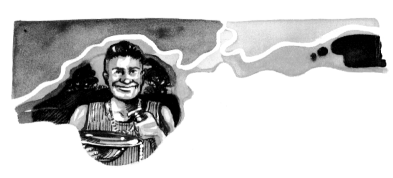

Tom Land, 33
Fort Worth, Texas
"Private, Tom Land, Ft. Worth!" "Here Sir!"
Those were the first words spoken to me as I was sworn into the United States Army. I was just 19 years old, fresh out of Masonic Home and School in Ft. Worth, Texas, and ready to defend my country in World War II. Life was lived fast and furious! I half believed him when the Sergeant, who told me I could sign up for the paratroopers, backtracked and said the Army needed "cannon fodder" to practice on, rather than just stuffed dummies that could not get out of the way of the rifles and bayonets!
Before long, it was off to Camp Walters in Mineral Wells, Texas, for six weeks of intensive training of learning how to march with the tune of 1-2-3-4 Right Flank! 1-2-3-4 Left Flank! Straight Ahead! To The Rear! March!
Next was my introduction to the headquarters of Camp Walters where I met up with my friend and former boss at Masonic Home and School, Lt. Col. Walter Linn, who took me under his wing and transferred me to staff headquarters.
After convincing Col. Linn I wanted to go fight the Germans, it was off to Camp Blanding, Florida; Little Rock, Arkansas; San Antonio, Texas, and back to Camp Walters for more intensive training, consisting of gas warfare and bayonet close encounters just in case the Germans got desperate and made a last-ditch stand before surrendering.
Of course, some of this theory came true. Again, I was moved to Rochester, New York, and was assigned to the 84th Division, made up mostly of Texans who were commanded by three-star general Hood Simpson from Weatherford, Texas.
Our next move was three days at sea, on our way to Omaha Beach, France, where we were to take and hold the territory our second Texas Division, Commanded by General Mark Clark, had gained the previous ten days of foxhole warfare. To our surprise the 84th Division was assigned to go up the English coast, and once again, assemble on the outskirts of the war to wait for the signal to begin what is now the famous Battle of the Bulge.
From December 16 to 26, 1944, the battle raged in the Ardennes along an 80-mile front held by an inadequate, it turned out, number of U.S. troops, many of whom, like myself, lacked battle experience. But the Germans were finally checked, though a devastating surprise attack had advanced them about 50 miles. The Battle of the Bulge, according to the Encyclopedia of American History, resulted in about 77,000 United States casualties, including 8,000 killed, 48,000 wounded, and 21,000 missing or captured.
I was among the latter and spent the last several months of the war not fighting in foxholes but riding in railroad boxcars and, as a prisoner of war, being put to forced labor. The Germans had taken over 600 soldiers from our 84th Division as prisoners, and I found myself assigned to picking in the vegetable fields of German families.
I also worked in German bread factories and helped milk cows. My milking days at the Masonic Home in Texas came in handy. The war was winding down at this point, and a couple of days later, all of us prison camp soldiers were awakened from our three or four hours of sleep with the music of Scottish bagpipes in the distance officially proclaiming the war in Europe was over [V-E Day, May 8, 1945], and we were free to go home! Of course, this was good news, but actually we had no place to go, and the disorganization was such that we all stayed in the prison camp until the U. S. trucks picked us up and took us to the Red Cross Headquarters.
There, we were given our first hot shower in months, issued new clothes and shoes, and then seated at dinner tables loaded with all sorts of American foods. That first night of sleeping on a mattress, instead of the floor, was a prayer answered!
The next three days were hectic because many of the guys were so sick, so weak from lack of food, and with bed sores caused by having been bitten by cockroaches, bugs, and other insects while they were prisoners-of-war.
At this point, many events were taking place. The Red Cross was passing out parcels of food, cigarettes, and other items too numerous to mention. One incident caused a lot of attention. After the cigarettes were passed out, one prisoner decided to save his cigarettes and smoke them later. The guy who slept next to him decided to steal his cigarettes, and they caught him the next morning. As punishment, the stealer of the cigarettes had to wear a plaque on his back for three days, and it read "I am a thief." Punishment was final!
Thank God the war was over. We heard the bagpipes in the distance, and we knew it was time to go home! I was not yet married, and I decided to attend North Texas University. Since I had the G.I. Bill money to pay my tuition and rent, I was on "easy street." My monthly expenses, including my rent, came to only $29.00! I waited tables morning and noon to make extra money and started dating a girl named Sylvia Ann Holder from San Antonio, Texas.
You can guess the rest; Holder was changed to Land in 1946, and when she passed away with cancer on Tuesday, July 9, 1991, we would have been married almost 44 years. Two sweet children, Susan Ann Land Escow and Michael David Land, were part of this happy marriage!
I have a lot of joys for which I am very thankful, and my children and
grandchildren make up most of my life's activities these days, along with
my Masonic activities, Sertoma Clubs, both downtown and local, the University
Baptist Church, and writing letters to my kinship.